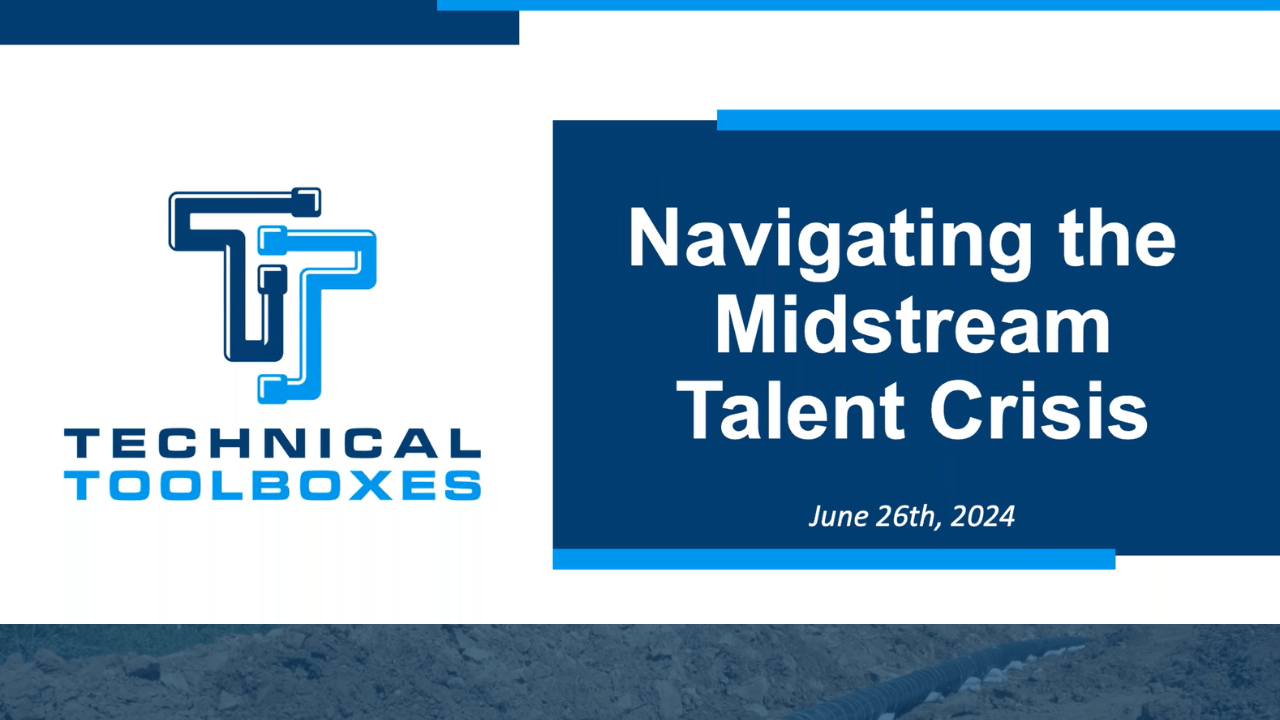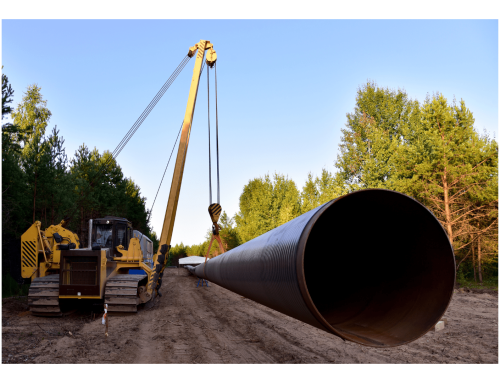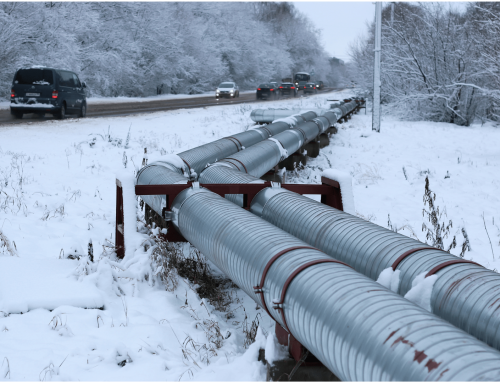Navigating the Midstream Talent Crisis: A Summary of the Expert Industry Panel
By Nick Rendall
The midstream oil and gas sector faces a significant talent crisis. With the number of petroleum engineering graduates dwindling and experienced professionals retiring, the industry must find new ways to attract, train, and retain talent. In the recent webinar hosted by Technical Toolboxes, experts from various sectors discussed these challenges and shared insights on how to address them effectively. Here is a summary of the major topics discussed and their impact on the industry.
Attracting New Talent
The panel highlighted the shrinking number of new graduates entering the energy industry, particularly in petroleum engineering. Cassandra Moody, President and Principal Engineer of Time for Change LLC, emphasized the need to broaden the search for talent beyond traditional petroleum engineering graduates. She suggested that employers look for skill sets in other engineering disciplines and even outside of engineering to meet the industry’s diverse needs:
“I’ve definitely seen a shift in the last decade or so in both the type of engineering majors that we’re seeing and also the quantity of them as well. As employers, we’ve had to expand our perspective and open our minds to different engineering disciplines and even disciplines outside of engineering to solve some problems.” -Cassandra Moody
Allen Hughes, Director of Engineering at Magnolia River, shared his experience of competing for talent in a region also home to NASA. He noted that despite the decline in mechanical and civil engineering graduates, being competitive in terms of compensation and work environment remains crucial.
Gary Hines, VP of Operations for the Pipeline Research Council International (PRCI), pointed out that the issue is not just industry-specific but part of a broader macro trend. He highlighted the increased competition for engineers from other sectors, including technology, which demands similar critical thinking and problem-solving skills.
Luke Jain, Founder of Golden Woods, discussed the importance of presenting meaningful work and competitive compensation to attract young talent. He noted that younger generations are also drawn to flexible work environments, which can be a significant factor in their decision-making process.
“One thing that’s kind of apparent is the need to convey that the work is meaningful. Also, offering very competitive compensation compared to other industries and the flexibility of remote work were crucial in attracting young talent”. -Luke Jain
Bridging the Gap Between Education and Industry
The panelists agreed that there is often a gap between the theoretical knowledge gained in academia and the practical skills required in the industry. Cassandra Moody pointed out that while new graduates are technically proficient, they often lack soft skills such as effective communication and problem-solving.
Allen Hughes stressed the importance of hands-on mentorship, advocating for face-to-face training, especially in the first few years, to provide new engineers with comprehensive on-the-job experience. He noted that it takes several years for new hires to gain a thorough understanding of all aspects of their work.
Gary Hines emphasized the need for intentional mentorship and the importance of engaging young professionals in industry organizations early in their careers. This approach not only broadens their professional network but also helps them stay updated with industry standards and practices.
“You’ve got to be intentional about giving back to them for that practical application of theoretical understanding. Universities are not designed for that. It’s important to engage them within professional organizations to broaden their horizons.” -Gary Hines
Leveraging Retired Experts and Knowledge Transfer
The panel discussed strategies for retaining and transferring knowledge from retiring professionals to younger employees. Allen Hughes shared his approach of hiring semi-retired PEs (Professional Engineers) to mentor younger staff. This practice ensures that valuable expertise is not lost and continues to benefit the company.
“I’ve always been a promoter of hiring retiree PEs. Today I’ve got two PEs with 70 years of experience between them. The more info they share with my younger staff, the greater we are as a company.” -Allen Hughes
Gary Hines echoed this sentiment, stressing the importance of intentional knowledge transfer. He highlighted the need to systematically capture and document the knowledge of experienced professionals to ensure business continuity.
“You can’t completely absorb everything from someone retiring with 20-30 years of experience, but if you don’t do anything intentional about it, you get nothing. We must systematically capture that knowledge.” -Gary Hines
Luke Jain underscored the value of bringing back retired experts as part-time employees or contractors. Their wealth of knowledge and experience can be an invaluable resource for training and mentoring new hires.
The Role of Training Programs
The panelists agreed on the importance of robust training programs to support the development of new and transitioning engineers. Cassandra Moody emphasized the need for both internal and external training programs, highlighting the role of industry organizations like Technical Toolboxes in providing comprehensive training resources.
Allen Hughes mentioned that Technical Toolboxes’ Training HUB has been instrumental in providing ongoing training for engineers, requiring them to complete at least 40 hours of training annually. This continuous education is crucial for keeping engineers updated with the latest industry standards and practices.
“…Time is so valuable in training and in the design side. Obviously, we use Technical Toolboxes and all of our engineers have access to it. And then just recently, we went with the Training HUB and each engineer is required to do at least 40 hours of training on an annual basis as part of their progression to the next level in engineering.”
Gary Hines discussed the potential of leveraging technology, such as artificial intelligence, to manage and access vast amounts of information and technical reports. This approach can help engineers quickly find relevant data, enhancing their efficiency and decision-making capabilities.
By leveraging the comprehensive training programs provided by Technical Toolboxes’ Training HUB and Premium Pass offerings, companies can ensure their engineers receive continuous education and stay current with industry standards. These programs not only enhance the skills of new and transitioning engineers but also play a critical role in knowledge retention and transfer within the organization. 
Conclusion
The insights shared by the panelists underscore the importance of adapting to new challenges in talent acquisition, training, and retention within the midstream sector. By expanding recruitment horizons, enhancing mentorship programs, leveraging the experience of retired professionals, and utilizing comprehensive training programs, the industry can address the talent crisis effectively.
To further explore these discussions and learn more about how Technical Toolboxes’ Training HUB and Premium Pass offerings can benefit your organization, I encourage you to watch the full webinar on our YouTube channel. Join us in navigating the midstream talent crisis and ensuring a robust future for the industry.
Suggested Post
The Network Modeling Tool Gas Engineers Didn’t Know They Needed
The Network Modeling Tool Gas Engineers Didn’t Know They Needed By Kesley Price You’ve outgrown your spreadsheets, now [...]
The Trusted Tool Gas Engineers Didn’t Know They Were Missing
Do You Really Know What’s Flowing Through Your Pipes? The Trusted Tool Gas Engineers [...]
2026 API Compliance: What You Need to Know
2026 API Compliance: What You Need to Know By Kesley Price New rules. Tougher [...]










